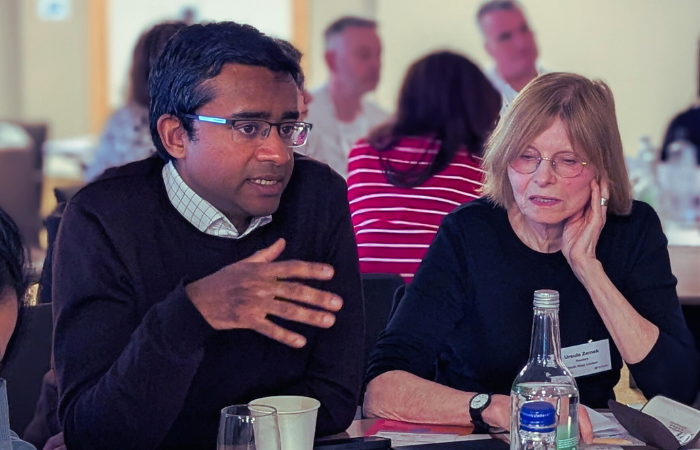Today, as part of a key partner of the Networked Data Lab, we have published a new satellite analysis report on the impact of Covid-19 on the mental health of children and young people. While the pandemic has impacted all of us, for children and young people, particularly significant milestones have been interrupted or lost – long school closures, cancelled exams and the disappearance of daily, in-person socialising have been enormous challenges.
As well as quantative analysis of Discover, North West London’s deidentified dataset, it was crucial for us to involve young people themselves to help shape and critically inform our interpretation of the data. Our Young Person’s Advisory Group was central to our approach and whose contribution we are incredibly grateful for.
The data for North West London showed that:
- General practice has been playing an increasing role in the management and care for children and young people with mental health conditions.
- The monthly number of those aged 0–25 years with a mental health related prescription or GP event (diagnosis, observation or referral) grew threefold between 2015 and 2021. There is evidence that this trend exists across the UK, and that it is likely a symptom of both increasing need and overstretched specialist services. Regardless of age, sex, ethnicity, IMD quintile or geography MH utilisation has increased, which has created significant fear for those already accessing mental health care that they would need to do significant harm to be seen.
- Some groups have had their access disrupted: Those aged 5-11 and 18-21 are specific cohorts who may have had decreased access
- Transition to adult services was disrupted: Transition between CAMHS to Adult mental health services, which has always been a challenged, seems to have been affected and delayed by the pandemic.
Our analysis is published in conjunction with the Health Foundation’s national report, which joins up analysis from labs across England and Wales. You can read the report in full here.
The analysis reveals that across the UK, the number of children and young people experiencing mental health problems is growing. Mental health services are expanding, but not fast enough to meet rising needs, leaving many children and young people with limited or no support. It also shows that too little is known about who receives care and crucially, who doesn’t.
The report are calls for more resources to be targeted at prevention among those most at risk of developing mental ill health. It highlights that general practice is likely to need additional support, as it faces crippling workforce shortages while also playing an increasing role in the management and care for children and young people with mental health conditions. Improvements in data collection, quality and analysis will also be crucial to inform policy decisions on where services need to expand to meet need and reduce health inequalities.
To genuinely realise the benefits of the NHS’s new Integrated Care Systems (ICSs) due to be rolled out this month, the availability and quality of data on children’s and young people’s mental health and their access to care must be improved and used more effectively. Under the recent Health and Care Act 2022, ICSs will represent the biggest legislative overhaul of the NHS in a decade. They will be responsible for planning all local services to improve health and reduce inequalities. The analysis will be particularly relevant for the newly established ICSs, providing insight into how crucial high-quality data and analytics will be to improve children’s and young people’s mental health services.
Matthew Chisambi, Project Lead, North West London Lab, said:
“Being part of the Networked Data Lab (NDL) has given us the opportunity to work with our local community, in this case young people, to not only identify priorities in the health and care system to investigate, but also to meaningfully engage with our population to help shape and critically inform our interpretation of the data. North West London has a great asset in Discover, a linked data set that is able to see a person’s interactions across different health and care settings. This gives us a much better understanding of how people actually use services rather than solely one aspect of care e.g. hospital care. I’ve been truly inspired by how insightful the young people we’ve worked with have been their openness to share their experiences all with the aim of improving care for all.”
Charles Tallack, Director of Data Analytics at the Health Foundation, said:
“The analysis shows that to improve the mental health of children and young people urgent investigation is needed into the deterioration of young women’s mental health, the drivers of marked socioeconomic inequalities, and the rapid growth in prescribing and use of GP support not just in the areas which took part in this analysis, but across the UK. Children and young people need support for their mental health more than ever, but gaps in data mean that we know too little about where services are most needed.
‘With the introduction of the ICSs this month, there is a real opportunity to address mental health problems among children and young people – but this vital window to support those most in need must not be missed. The ICSs will have access to datasets across primary, secondary, mental health, social and community care which is a major step forward that needs to be used to maximum benefit.
‘We already know that the prevalence of mental health problems varies by sex, age, and socioeconomic deprivation but data on who is receiving support is not widely available and is currently not detailed enough to show the variation by these characteristics. High-quality data and analysis will play a crucial role in targeting preventative interventions, better planning of services and ultimately, improving children’s and young people’s mental health. It is vital that local areas are supported to make better use of data to help inform decision making.”



